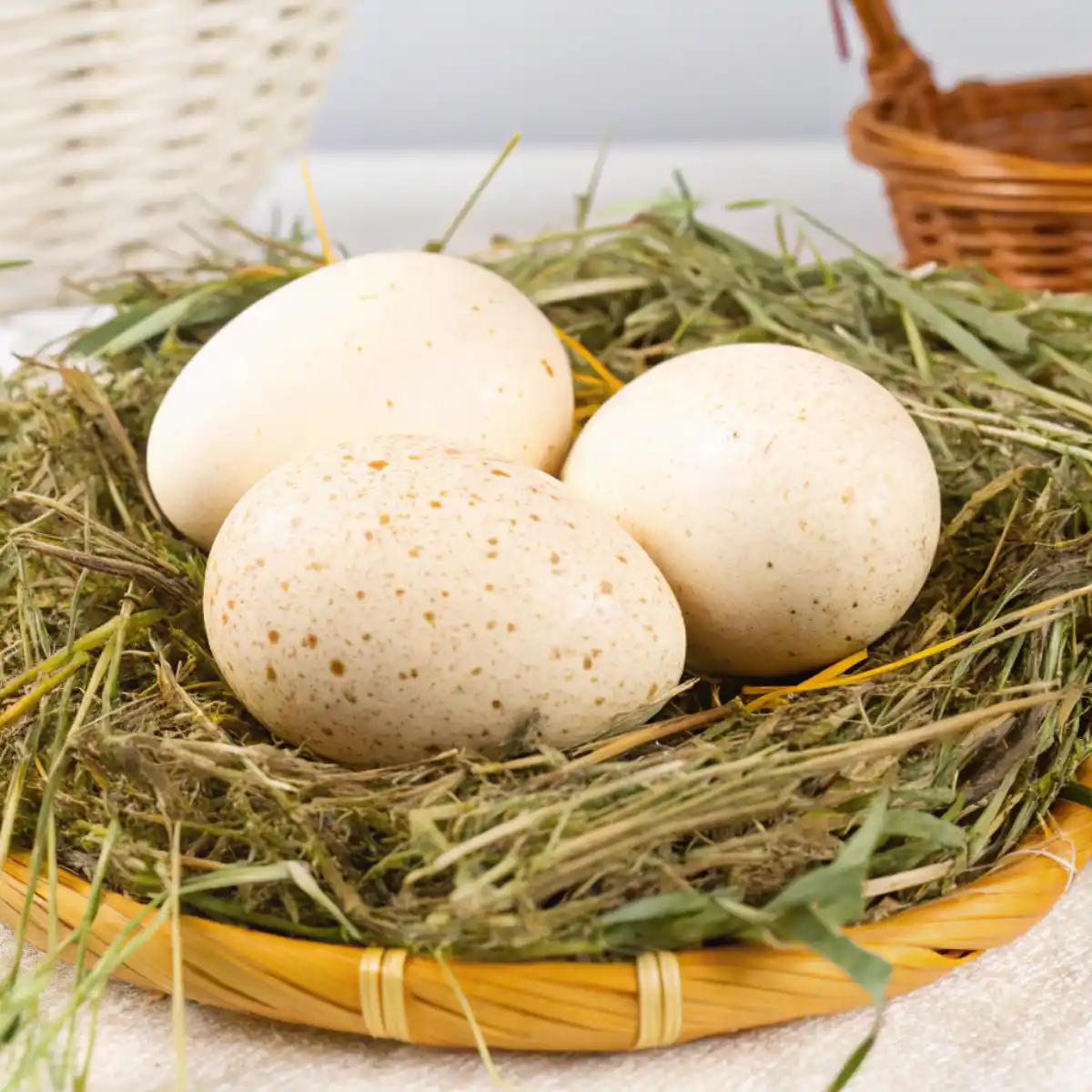The first time I cracked open a turkey egg, I was amazed. Its rich, golden yolk and unique flavor were unlike any chicken egg. Many wonder where to find these specialty eggs, as they’re not common in stores.

Table of Contents
Looking for turkey egg sources is like a culinary adventure. Unlike chicken eggs, turkey eggs are rare but offer a special taste for those who love to cook. Your search will lead you to local farms, specialty markets, and direct producers.
If you’re a chef or a home cook looking for new flavors, knowing where to buy turkey eggs is key. This guide will help you find these special eggs. You’ll learn about local and online markets to get your hands on them.
Key Takeaways
- Turkey eggs are less common but offer unique flavor profiles
- Local farms and specialty markets are primary turkey egg sources
- Direct farmer connections provide the freshest turkey eggs
- Online platforms offer alternative purchasing options
- Seasonal availability impacts turkey egg procurement
Understanding Turkey Eggs: Characteristics and Benefits
Turkey eggs are a special and interesting choice compared to chicken eggs. They are not as common in stores but have unique nutritional benefits and cooking uses. Knowing about turkey eggs can help you find them from turkey egg providers.

Nutritional Powerhouse
Turkey eggs are a nutritional powerhouse. They have more nutrients and are a great protein source for those who care about their health.
- Larger egg size with more substantial yolk
- Higher protein concentration
- Rich in vitamins A, B12, and minerals
- Excellent source of selenium and zinc
Distinctive Physical Characteristics
Turkey eggs look and feel different from chicken eggs. Their unique look makes them special in any egg collection.
| Characteristic | Turkey Eggs | Chicken Eggs |
|---|---|---|
| Average Size | Larger (about 2-3 inches) | Smaller (1.5-2 inches) |
| Shell Color | Tan with speckled pattern | White or brown |
| Yolk Size | Significantly larger | Standard size |
Seasonal Availability Insights
Turkey egg availability changes throughout the year. It mainly depends on breeding cycles. Most providers have more eggs in spring and early summer. Knowing this helps you plan your egg purchases better.
“Turkey eggs are nature’s hidden culinary treasure, offering unique flavor and nutritional benefits.” – Poultry Nutrition Expert
Exploring turkey eggs opens up new culinary adventures. They are great for chefs looking for unique ingredients or health enthusiasts wanting nutrient-rich options. These eggs are an exciting alternative to traditional eggs.
Local Farm Markets as Prime Sources for Turkey Eggs

Finding fresh turkey eggs is an exciting journey. Local farm markets are the perfect place to start. These markets connect you with turkey egg farmers who are passionate about their work. They take pride in offering high-quality, farm-fresh eggs.
When you visit turkey egg markets, keep these tips in mind:
- Arrive early for the best selection of turkey eggs
- Engage with farmers about their turkey egg production methods
- Ask about their turkey breeds and farming practices
- Inspect eggs for freshness and quality
Local turkey egg farms offer benefits that supermarkets can’t. You’ll know exactly where your eggs come from and support local farmers.
“Farm markets offer the most direct connection between consumers and turkey egg producers” – Local Farming Association
To find top turkey egg farms near you, check out these resources:
- Local farmers market directories
- Community agricultural websites
- State farming cooperative listings
- Social media farm network groups
Remember, turkey egg availability changes with the seasons. Building relationships with local farmers keeps you updated on their production.
Explore Related Recipes and Tips
Boost your knowledge and discover more about turkey eggs and related recipes with these helpful resources:
- Irresistible Ground Turkey and Egg Recipes
Learn delicious ways to combine turkey and eggs for any meal. - Turkey and Eggs
A detailed look at turkey eggs, their benefits, and how they compare to other egg types. - Your Perfect Breakfast Plate: Start the Day Right
Explore creative breakfast ideas to complement turkey eggs. - Health Benefits of Purple Sweet Potato
Pair turkey eggs with this superfood for a nutrient-packed meal. - Quick & Easy Breakfast Ideas
Simplify your mornings with quick, high-protein recipes.
Finding Specialized Poultry Farms Near You
Looking for local turkey egg suppliers means doing some research and networking. You might find unique poultry farms that offer better turkey eggs than usual.
Visiting turkey egg farms lets you meet farmers who love their work. They focus on raising special turkeys, giving you a chance to try something new.
Heritage Turkey Breeders
Heritage turkey breeders are a special group. They work hard to keep rare turkey breeds alive. Their focus on traditional methods means:
- Rare turkey breed preservation
- Genetically diverse turkey populations
- Higher-quality egg production
Small-Scale Family Farms
Small family farms give you a personal touch. They have smaller flocks, which means better care and quality eggs.
| Farm Type | Egg Characteristics | Production Volume |
|---|---|---|
| Heritage Farms | Large, Rich Flavor | Limited Seasonal |
| Family Operations | Fresh, Consistent Quality | Small Batch |
Organic Turkey Operations
Organic turkey farms focus on being green and fair. They follow strict rules to ensure:
- No synthetic pesticides
- Pasture-raised turkeys
- Non-GMO feed
“Supporting local turkey egg farms means investing in sustainable agriculture and exceptional food quality.” – Sustainable Farming Association
To find these farms, join local farming groups, visit farmers markets, and check online directories. They help you find farms that care about the environment and quality.
Where Can I Buy Turkey Eggs Online
Looking for turkey eggs online is now simpler thanks to digital marketplaces. You can find many online stores that sell fresh turkey eggs and deliver them right to your home.
Shopping for turkey eggs online needs some planning. Here are some top sites to buy turkey eggs:
- Specialty Poultry Websites
- Direct Farm Online Stores
- Artisan Food Marketplaces
- Small-Scale Agricultural Platforms
When you’re looking for turkey eggs online, keep these points in mind:
- Make sure the farm is reputable and has good reviews
- Check how eggs are shipped and packaged
- Know when you can expect your eggs
- Ask about guarantees of egg freshness
“Online turkey egg shopping offers convenience and access to unique agricultural products that might not be available locally.” – Sustainable Agriculture Network
Platforms like Etsy, LocalHarvest, and poultry websites have lots of turkey egg sellers. They connect you with farmers who raise rare turkey breeds.
If you’re watching your budget, compare prices on different websites. Some offer discounts for buying in bulk, which can lower the cost per egg.
Pro tip: Always check if the seller can ship eggs well, especially in bad weather that could harm the eggs.
Specialty Food Stores and Natural Markets
Finding fresh turkey eggs means shopping smart at specialty stores and natural markets. These places are full of treasures for those who love high-quality, local food. They offer eggs from turkey sellers who care about their products.
Looking for eggs in these markets is an adventure. You’ll find unique places that focus on special agricultural items.
High-End Grocery Chains
Premium grocery stores now carry specialty eggs from local farms. Look for places that:
- Focus on local products
- Offer artisanal and heritage breed eggs
- Work with small farmers
Health Food Store Options
Health-focused stores often partner with turkey egg sellers. They usually have:
- Organic and free-range eggs
- Staff who know about sustainable farming
- Links to local poultry farms
Farmers’ Market Directories
Farmers’ market directories help you find local egg sellers. Pro tip: Use online platforms and local sites to find markets near you.
“Fresh eggs tell a story of local agriculture and community connection.” – Small Farm Journal
By checking out these markets, you’ll find amazing turkey eggs. Plus, you’ll support local farmers.
Building Direct Relationships with Turkey Egg Suppliers
Getting direct from turkey egg suppliers can change how you buy eggs. Reaching out to local farmers can bring many benefits. You get fresh, quality eggs and help local farms.
Here are some ways to find turkey egg suppliers:
- Attend local farmers markets
- Visit small-scale poultry farms
- Join agricultural community groups
- Network with regional turkey egg providers
Pro Tip: Good communication is crucial. Ask about their farming, egg production, and when eggs are available.
“Personal connections can lead to consistent, high-quality egg sources.” – Local Farm Expert
Here’s a guide to talk to turkey egg suppliers:
| Approach Strategy | Benefits |
|---|---|
| Direct Farm Visits | See production conditions firsthand |
| Phone Consultation | Discuss specific egg requirements |
| Seasonal Contracts | Guarantee regular egg supply |
Building strong ties with turkey egg suppliers offers many perks. You get fresher eggs, possibly better prices, and learn about local farming. Your support helps small farmers and ensures you get nutritious turkey eggs.
Understanding Turkey Egg Pricing and Availability
Finding turkey eggs can be tough for cooks and food lovers. Turkey egg sellers deal with special market issues that change prices and supply all year.
Turkey egg prices change for a few main reasons. Turkey eggs are a special item, made in smaller amounts than chicken eggs.
Seasonal Price Variations
Turkey egg prices go up and down with the seasons. This is because of breeding times and farm work. Here’s when you might get a better deal:
- Spring: More eggs, possibly cheaper
- Summer: Prices are pretty steady
- Winter: Fewer eggs, prices might be higher
Bulk Purchase Strategies
Buying in bulk can help you save money. Here are some tips from local turkey egg sellers:
- Buy straight from the farm
- Join seasonal buying groups
- Make pre-orders with local farmers
| Purchase Volume | Potential Savings | Recommended For |
|---|---|---|
| 1-2 dozen | 0-5% | Individual consumers |
| 3-5 dozen | 5-10% | Small families |
| 6+ dozen | 10-15% | Large families, restaurants |
Storage Considerations
Storing turkey eggs right is key to keeping them fresh. Store eggs in the fridge at 45°F or below and use them within 2-3 weeks for the best taste and quality.
“Turkey eggs are a delicate product that requires careful handling and storage” – Artisan Poultry Farms
Legal Requirements for Purchasing Farm-Fresh Turkey Eggs
Buying farm-fresh turkey eggs can be tricky. You need to know the laws that protect you and the farms. These rules help keep both buyers and farms safe.
The USDA and local health departments have strict rules for selling turkey eggs. These rules make sure the eggs are safe and of good quality. They help those who want to buy from local farms.
- Farms must get the right license for egg production
- They need to pass regular health checks
- Eggs must be clean and kept cold
- They must be packaged with clear info on where they came from and when
“Food safety starts with good farming and clear rules.” – USDA Food Safety Guidelines
Different states have their own rules for turkey egg farms. Some important things to know include:
| Legal Requirement | Details |
|---|---|
| Egg Grading | Must meet USDA quality standards |
| Sales Locations | Regulated farmers markets, direct farm sales |
| Health Certification | Mandatory veterinary health documentation |
When you buy from turkey egg farms, ask for proof they follow the rules. This way, you get safe, quality eggs. Plus, you support local farmers.
Tips for Selecting and Storing Fresh Turkey Eggs
Finding turkey eggs can be hard for many. It’s important to know how to pick, store, and keep them fresh. This ensures the best taste and quality in your cooking.
When you buy turkey eggs from local providers, knowing how to choose and store them is key. It greatly affects the quality and freshness of your eggs.
Quality Indicators to Assess
Choosing top-quality turkey eggs needs careful checking. Look for these important signs:
- Clean, intact shell with no visible cracks
- Uniform shell color without unusual spots
- Smooth shell texture
- No unusual odors
Optimal Storage Methods
Storing eggs right is crucial for keeping them fresh. Here’s how to do it:
- Store eggs at consistent temperatures between 45-50°F
- Keep eggs in their original carton
- Place eggs in the refrigerator’s main compartment
- Avoid storing near strong-smelling foods
Shelf Life Guidelines
| Storage Location | Maximum Freshness Duration |
|---|---|
| Refrigerator (40-45°F) | 3-4 weeks |
| Room Temperature | 1-2 days |
| Cooler Environment | Up to 2 weeks |
Pro tip: Always check eggs before use, regardless of storage duration.
“Fresh eggs are a treasure – handle them with care!” – Poultry Experts
Alternative Sources During Off-Season Periods
Finding turkey egg sources can be tough when they’re not in season. Smart shoppers use different strategies to get these eggs all year.
- Contact specialized poultry farms with extended laying seasons
- Explore commercial hatcheries with year-round production
- Connect with heritage turkey breeders who manage consistent egg supplies
Professional turkey egg sources often have breeding programs for steady egg production. Some good choices include:
| Source Type | Availability | Procurement Strategy |
|---|---|---|
| Online Specialty Farms | High | Direct website purchases |
| Regional Hatcheries | Moderate | Seasonal pre-orders |
| Agricultural Cooperatives | Variable | Membership-based ordering |
Pro tip: Develop relationships with local turkey egg vendors to secure advance notifications about upcoming egg availability.
“Persistence is key when searching for unique agricultural products like turkey eggs.” – Sustainable Farming Magazine
If finding turkey eggs directly is hard, think about egg substitutes. Quail or duck eggs can cook like turkey eggs when they’re not available.
Conclusion
Looking for where to buy turkey eggs is an exciting journey. You can find fresh, high-quality turkey eggs through many ways. From local farm markets to online stores, you now know how to get these special eggs.
Start by checking local places first. Small farms, heritage breeders, and farmers’ markets offer the best eggs. Online stores also help, especially if local options are scarce.
Choose eggs based on quality, freshness, and legal rules. Know when they’re in season, how to store them, and find reliable sellers. This guide helps you find the best turkey eggs for your meals.
Learning about turkey eggs opens up a world of taste and nutrition. Keep exploring local markets and online stores. Enjoy the unique taste of turkey eggs from trusted sources.
FAQ
Are turkey eggs legal to buy and sell in the United States?
Yes, turkey eggs are legal to buy and sell in the United States. They are less common than chicken eggs. You might need to look for local farms, farmers’ markets, or online poultry vendors.
How much do turkey eggs typically cost?
Turkey eggs cost more than chicken eggs. They can range from $3 to $8 per egg. The price depends on the source, season, and how they are produced. Organic and heritage breed turkey eggs are usually more expensive.
Where can I find turkey eggs in my local area?
You can find turkey eggs at local farm markets, heritage turkey farms, and small-scale family farms. They are also available at farmers’ markets, high-end grocery stores, and through direct poultry suppliers.
Do online retailers sell turkey eggs?
Yes, online platforms and specialty food websites sell turkey eggs. Look for reputable farm-direct sellers. Make sure they offer safe shipping to keep the eggs fresh.
How are turkey eggs different from chicken eggs?
Turkey eggs are larger and have a more robust flavor than chicken eggs. They have a speckled appearance and are richer in some nutrients. This is due to the turkey’s diverse diet and breeding characteristics.
Are turkey eggs seasonal?
Turkey eggs are less available than chicken eggs. Most turkey farms focus on meat production. So, egg availability is limited to specific seasons, usually from spring to early fall.
How should I store turkey eggs?
Store turkey eggs in a cool, consistent temperature (around 45-50°F). Keep them in a sealed container, pointed end down. Use them within 2-3 weeks for the best freshness and quality.
Can I substitute turkey eggs in recipes?
Yes, you can substitute turkey eggs in most recipes. They are larger than chicken eggs. Use about 1.5 to 2 chicken eggs for every turkey egg. Adjust your recipe to maintain the right moisture and binding properties.
Are there organic turkey egg options?
Yes, some organic turkey farms produce eggs from heritage breeds. These eggs are raised without synthetic pesticides, hormones, or antibiotics. You can find them through specialized organic poultry suppliers and some high-end farmers’ markets.
What should I look for when buying turkey eggs?
When buying turkey eggs, look for clean, intact shells without cracks. They should have a fresh appearance and minimal discoloration. Ask the supplier about the farm’s practices, egg collection date, and the turkeys’ diet and living conditions.

